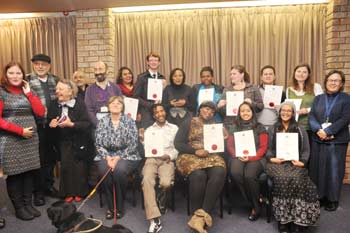Medical interpreters a boon for public health
15 June 2012 | Story by Newsroom Sign of the changing times: Representatives from the Faculty of Health Sciences celebrated with graduates from the country's first medical-sign-language course.
Sign of the changing times: Representatives from the Faculty of Health Sciences celebrated with graduates from the country's first medical-sign-language course.
Holding true to its pioneering spirit, UCT's Faculty of Health Sciences officially certified the path-breaking graduates of an accredited medical-sign-language interpreter course - the first in South Africa - at a merry ceremony on 12 June.
The course, Introduction to community medical sign (SASL) language interpreting, is the brainchild of Dr Marion Heap of the faculty's School of Public Health and Family Medicine. Heap, along with others, has long argued that public healthcare services in South Africa suffer from lack of effective communication between practitioners and patients, including deaf people who use signed language.
A dozen students successfully completed the course, taught at UCT by Elizabeth Deysel and Susan Lombaard of the University of the Free State between November 2011 and March 2012.
Reneitte Popplestone, head of UCT's Disability Service, lauded the graduates and said the occasion represented the essence of what transformation is about: "equitable access and meaningful communication".
"[This course] is about empowering people to change the conditions that make them vulnerable," added Professor Leslie London, director of the School of Public Health and Family Medicine.
 This work is licensed under a Creative Commons Attribution-NoDerivatives 4.0 International License.
This work is licensed under a Creative Commons Attribution-NoDerivatives 4.0 International License.
Please view the republishing articles page for more information.










